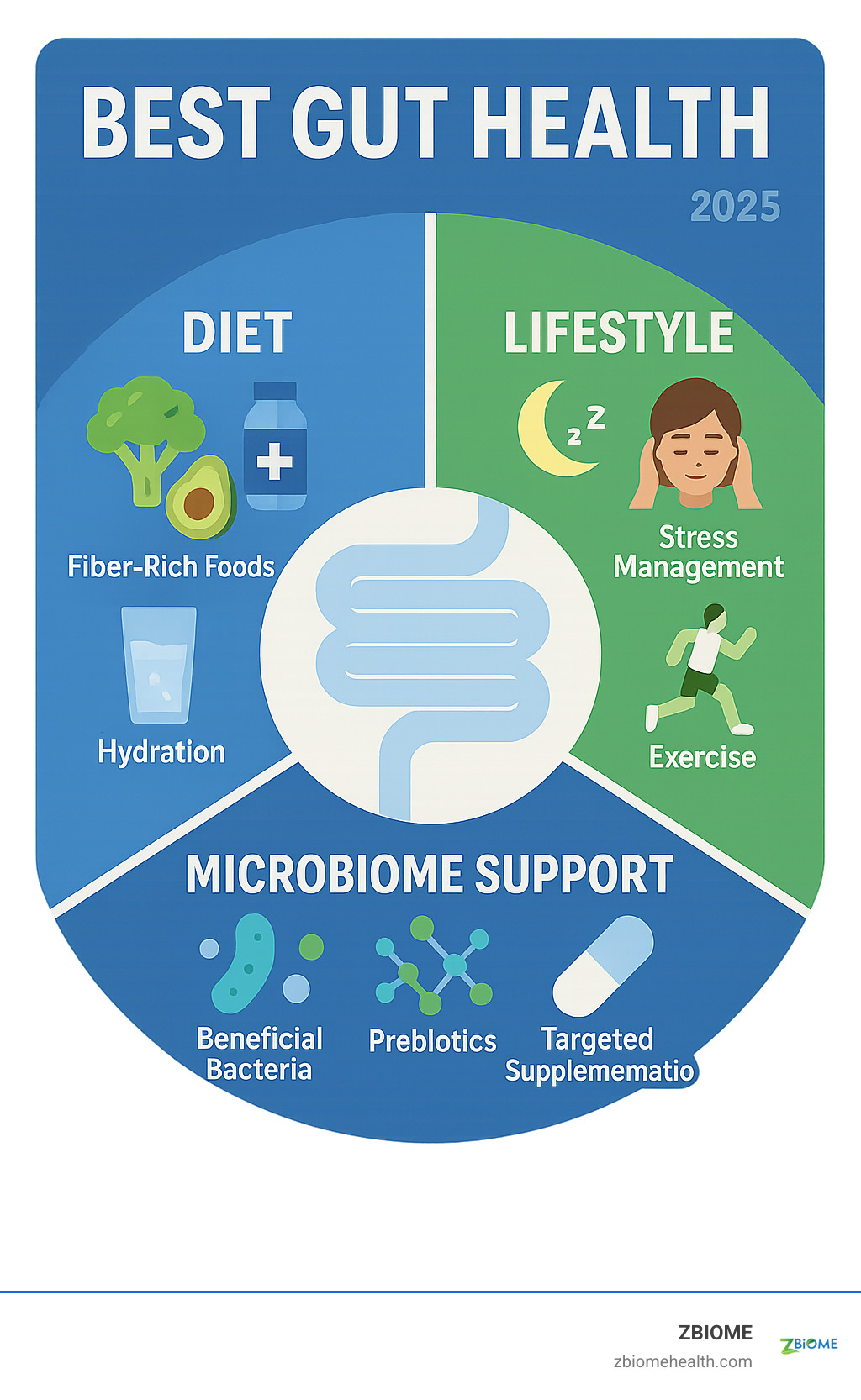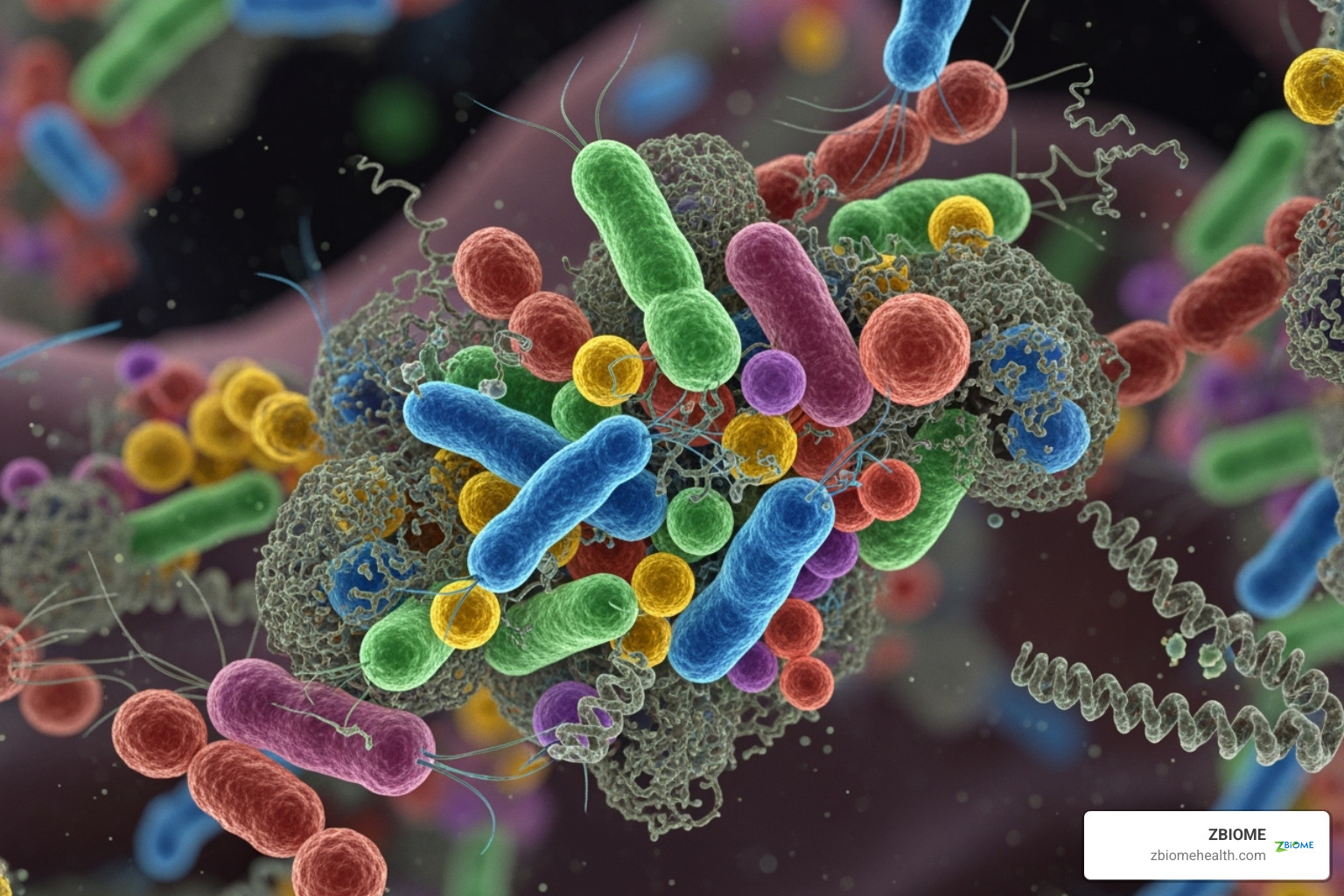Why Your Gut Health Matters More Than Ever
Best gut health starts with understanding your digestive system is the foundation of your overall well-being. As one gastroenterologist puts it: "Digestive system problems such as heartburn, gas, bloating and constipation reflect what's happening throughout your body."
Quick Guide to Best Gut Health:
- Eat 21-38 grams of fiber daily from fruits, vegetables, and whole grains
- Include probiotics with at least 10 billion CFUs for general health
- Get 7-9 hours of sleep nightly to support gut bacteria
- Exercise 150-270 minutes weekly to boost microbiome diversity
- Manage stress through relaxation techniques and meditation
- Stay hydrated with 4-6 cups of water daily
Your gut houses trillions of microorganisms that impact your digestion, immune system, and mood through the gut-brain connection. When this ecosystem is imbalanced, you might experience bloating, irregular bowel movements, or fatigue.
Research shows simple dietary and lifestyle changes can improve your gut microbiome within weeks. However, most Americans get only half their recommended fiber and inadequate sleep or exercise, all of which impact gut health.
Modern diets, stress, and sedentary lifestyles contribute to gut imbalances. But combining proper nutrition, targeted supplementation, and healthy habits can restore digestive harmony for better energy, mood, and overall health.
I'm Tarek El Ali, a healthcare consultant with advanced training from Harvard Medical School. I specialize in translating clinical insights into practical strategies for achieving best gut health and optimal wellness.

Understanding Your Gut Microbiome: The Foundation of Health

Your gut microbiome is a complex ecosystem in your digestive tract, home to trillions of microorganisms like bacteria, viruses, and fungi. Most of these microbes are allies, working to keep you healthy.
Like a thriving forest, your best gut health depends on gut diversity. A wide range of beneficial microbes working together keeps your body running smoothly. These microbes are essential for digestion and nutrient absorption, but their role extends much further.
The gut-brain axis is a communication highway connecting your digestive system and brain. This explains why stress affects your stomach and why a balanced microbiome supports mood regulation.
Your gut also houses about 70% of your immune system. Beneficial bacteria help train immune cells, and a thriving microbiome leads to reduced inflammation body-wide.
Research shows that a healthy gut microbiome may reduce risk of conditions like diabetes, heart disease, certain cancers, and inflammatory bowel conditions.
Your microbiome is highly responsive to care. Small changes in diet, sleep, and stress management create positive ripple effects. Open up your gut's potential with natural approaches and let your microbial allies help you feel your best.
The Pillars of Diet for Your Best Gut Health
What you eat directly shapes your gut's inner ecosystem, giving you a powerful tool for achieving best gut health. Fiber is your gut's best friend, promoting regularity and feeding beneficial bacteria. Most Americans need 21-38 grams daily but get only half that amount. Hydration is also crucial, as water helps with nutrient absorption and waste movement.
Prebiotics and probiotics are a power couple for gut health. Prebiotics (special fibers) feed probiotics (beneficial microbes), creating a synergistic effect for your digestive health.
Foods to Eat for a Happy Gut

Fiber-rich foods are the foundation for a happy gut. Prioritize whole grains like oats and quinoa, legumes like beans and lentils, leafy greens like spinach, and fruits like apples and berries.
Fermented foods are a secret weapon, introducing beneficial bacteria directly into your system. Choose yogurt and kefir with live cultures, sauerkraut, kimchi, and kombucha to add diverse probiotic strains to your diet.
Prebiotic-rich foods fuel the good bacteria you already have. Onions, garlic, asparagus, slightly unripe bananas, apples, and beans are all excellent sources.
Here are the top 10 prebiotic-rich foods to prioritize:
- Onions
- Garlic
- Asparagus
- Bananas (especially slightly unripe ones)
- Apples
- Berries
- Jerusalem Artichokes
- Beans
- Lentils
- Oats
Foods to Limit for Better Digestion
Some foods can disrupt your gut's balance. Limiting them supports the healthy ecosystem you're building.
Processed foods, low in fiber and high in additives, can irritate the gut lining. Refined sugars and artificial sweeteners can feed less helpful bacteria, leading to imbalance. Unhealthy fats from fried and fast foods are hard to digest and can cause sluggishness. Grilling or baking is a gentler option.
Red meat and high-fat dairy can be harder to digest, so moderation is key. The goal is not perfection, but consistency. Choosing whole, unprocessed foods most of the time gives your digestive system the tools it needs to keep you feeling your best.
Probiotics and Prebiotics: The Dynamic Duo for Gut Harmony
Think of your gut as a garden. Probiotics are the beneficial plants, and prebiotics are the fertilizer. Together, they create the perfect partnership for achieving best gut health.
Probiotics are live beneficial microorganisms that reinforce your gut's "good" bacteria, helping to prevent dysbiosis (an imbalance of gut microbes). Prebiotics are special fibers your body can't digest but that serve as fuel for your beneficial gut bacteria. This combination is called synbiotics. The prebiotics fuel the probiotics, making them more effective and helping them thrive in your digestive system.
Choosing the Right Probiotics for Your Needs
Choosing a probiotic can be overwhelming. Here's what to look for on your best gut health journey.
CFU count (Colony-Forming Units) indicates the number of live microorganisms. While 10 billion CFUs daily is good for general health, higher counts can address specific concerns.
ZBIOME Health takes this seriously, offering a robust 60 Billion CFU in their comprehensive supplement, combined with digestive enzymes and prebiotics—all for just $27, which is significantly less than buying these components separately.
Specific strains are also crucial, as different bacteria perform different jobs. Lactobacillus and Bifidobacterium are common beneficial strains. Look for products that list specific strains. Probiotics must also survive stomach acid to be effective. Quality supplements use protective coatings or packaging to ensure they reach your intestines alive. High-potency probiotics guide and The role of digestive enzymes offer deeper insights.
Powering Up with Prebiotic Fibers
Prebiotics are the essential fuel for probiotics. Without them, beneficial bacteria struggle to establish themselves. Key prebiotic fibers include inulin, fructooligosaccharides (FOS), and other soluble fiber. These fibers create an environment where beneficial microbes can multiply, which is why a combined approach is so effective.
ZBIOME's comprehensive formula includes 4 different prebiotics specifically chosen to fuel their 60 Billion CFU probiotics.
You can boost your intake naturally with foods like onions, garlic, bananas, and asparagus. These everyday foods are powerful tools for your microbiome. The power of prebiotics truly showcases how these simple fibers can transform your digestive health.
Lifestyle Habits That Make or Break Your Gut Health

Your gut health is deeply connected to your daily life. How you sleep, manage stress, and move can make or break your digestive wellness. Embracing holistic wellness is key for best gut health, as small, daily habit changes send positive signals to your gut microbiome.
The Surprising Link Between Sleep and Your Gut
Your gut microbes depend on quality rest. Most adults need 7-9 hours of sleep per night for a healthy microbiome. Research on gut bacteria and sleep quality shows a two-way link: poor sleep disrupts gut bacteria, and an unhealthy gut can impair sleep quality.
Your circadian rhythm (internal clock) regulates digestion, and irregular sleep schedules disrupt this delicate system. Prioritize good sleep hygiene: create a relaxing routine, keep your room cool and dark, and maintain a consistent sleep schedule. Your gut will thank you with better digestion.
Managing Stress to Soothe Your Digestive System
The gut-brain connection is powerful, and stress directly impacts your digestive system. Stress releases hormones like cortisol and adrenaline. Chronic stress can trigger digestive symptoms like pain, bloating, and irregular bowels, and is a common trigger for IBS flare-ups.
Because the connection works both ways, calming your mind can soothe your gut. Simple relaxation techniques make a huge difference. Meditation, even for five minutes, can reset your nervous system. Deep breathing activates the "rest and digest" mode, telling your gut it's safe to function properly.
How Exercise Boosts Your Gut Microbiome
Regular exercise is one of the most effective ways to improve gut health. Getting 150-270 minutes per week of moderate exercise boosts gut microbiome diversity, reduces inflammation, and improves digestive function. The positive effects of regular exercise are well-documented.
Both aerobic exercise (like walking or swimming) and resistance training (like lifting weights) contribute. Exercise improves transit time and increases blood flow to the gut. You don't need to be a marathon runner; even a daily walk helps. Your gut microbiome responds quickly to increased physical activity, with positive changes often seen in weeks.
Listening to Your Gut: Recognizing Issues and When to Seek Help
Learning to listen to your gut's signals is a key step toward achieving best gut health. It's important to distinguish between occasional issues and persistent patterns that may signal a deeper problem. Being proactive means tuning in to what your body is telling you.
Common Signs of Gut Imbalance
An imbalanced gut will send warning signs. Pay attention to these common symptoms:
- Bloating and excessive gas are common indicators, often related to food fermentation in the gut.
- Constipation (infrequent bowel movements) or diarrhea (loose, watery stools) signal that something is off.
- Abdominal pain, cramping, and heartburn or acid reflux are clear signs of digestive distress.
- Gut issues can also manifest as new food intolerances, skin issues like acne or eczema, or unexplained fatigue, as poor nutrient absorption and inflammation affect the whole body.
These symptoms can be gradual, but they are your gut's way of communicating that it needs attention.
When to Consult a Doctor for Your Best Gut Health
While lifestyle changes help, some symptoms require a doctor. What doctors wish patients knew is that early intervention often prevents bigger problems.
See a doctor for persistent symptoms that last several weeks despite diet and lifestyle changes. Other red flags that warrant a medical consultation include:
- Unexplained weight loss
- Blood in your stool
- Severe or worsening abdominal pain
- Sudden changes in your bowel habits
- Difficulty swallowing, persistent heartburn, or chronic nausea
A healthcare provider can run tests to find the cause. They may suggest a registered dietitian for a personalized eating plan or refer you to a digestive health specialist for expert care.
Frequently Asked Questions about Achieving the Best Gut Health
Here are answers to common questions people have when starting their journey to best gut health.
How long does it take to improve gut health?
Your gut microbiome can start to change within a few days of dietary improvements. However, noticeable benefits like reduced bloating or better regularity typically take weeks to a few months of consistent effort. When starting probiotics, consistency is key, as it can take several weeks to notice a difference. Managing expectations when starting probiotics can help guide you.
Can I take probiotics and prebiotics together?
Yes, absolutely. Taking them together is a smart approach called synbiotics. Prebiotics act as fertilizer for probiotics (the beneficial seeds). They feed the good bacteria, helping them thrive in your gut. This synergy improves the effectiveness of both, leading to better results for your best gut health than taking either alone.
Are all fermented foods good sources of probiotics?
Not all fermented foods are good sources of probiotics. Pasteurization and cooking (like in sourdough bread) kill the live, beneficial bacteria. To get probiotic benefits, look for labels that specifically mention "live and active cultures" on products like yogurt, kefir, kimchi, and kombucha, which are typically found in the refrigerated section. Benefits of fermented foods provides excellent guidance on making the most of these options.
Conclusion
The journey to best gut health is transformative, impacting everything from energy and immunity to mood. Lasting change comes from three pillars: a nourishing diet rich in fiber and beneficial bacteria; supportive lifestyle habits like quality sleep, stress management, and movement; and targeted support with probiotics and prebiotics.
Gut health isn't about perfection; it's about making small, consistent changes that yield significant results. Every healthy choice—eating an apple, taking deep breaths, prioritizing sleep—nurtures your beneficial gut microbes.
It's encouraging how quickly the body responds. Dietary shifts can alter the microbiome in days, with noticeable benefits appearing in weeks to months. This creates a positive cycle: better gut health leads to better choices, further improving your well-being.
For those seeking comprehensive support on this journey, ZBIOME Health understands that achieving optimal gut wellness shouldn't require juggling multiple supplements or breaking the bank. Our all-in-one formula brings together 60 Billion CFU of carefully selected probiotics, 9 digestive enzymes for improved nutrient absorption, and 4 prebiotics to fuel those beneficial bacteria - all in one convenient, science-backed supplement at just $27. This integrated approach means your probiotics have the enzymes they need to work effectively and the prebiotic fuel to thrive and multiply.
Your gut communicates daily through your energy, mood, and digestion. By listening and responding with the care we've discussed, you're not just improving digestion—you're opening up your body's full potential for vitality. Open up the power of ZBIOME for your probiotic wellness and gut health.




